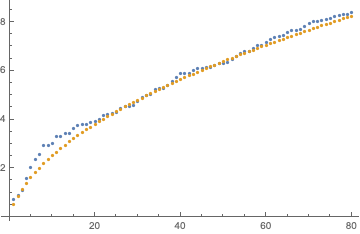Consider the following sum :
$$S(p,q;s)=\sum_{n=1}^q\frac{\sin^2(\frac{p\Gamma(n)}{n})}{n^s}$$
Here , $p$ is a variable w.r.t which we are going to analyse the sum.
$s$ is another parameter with domain $s\in(0,1]$.
I tried to use Abel - Plana summation formula (ABSF) for partial sum :
we can get some crude estimates on integral :
$$I_1(q)= \int_1^q\frac{\sin^2(\frac{p\Gamma(t)}{t})}{t^s}dt $$
as $q\rightarrow \infty $
( Integrand oscillates very wildly in right half plane )
But it seems that second integral in ABSF is impregnable .
Second integral in ABSF:
$$I_2(x)=\int_0^\infty \frac{F(x + iy,s) − F(x − iy,s)}{e^{2πy}-1}dy$$
Where , $F(z)=\frac{\sin^2(\frac{p\Gamma(z)}{z})}{z^s} $
I tried to get estimate on this as $x\rightarrow \infty $ but in vain .
The reason I chose ABSF is that $\Gamma$ is a 'nice' function in terms of complex variables and due to this I'm optimistic about the $I_2$
The importance of this function lies in the fact that , See for ex . for $p=π/2$ the $\sin^2$ term is finite for primes and zero for non primes . So I mentioned 'sharp' for this purpose . I need critical details of $I_2$.
( I'm just following the advice of F.R.Villegas to generalize the series with such parametrization.)
Question : Can we get an 'Sharp' estimates on the sum w.r.t parameters $p$ and $s$?
Can we prove the divergence of series (as a whole) for specified conditions on $p$?
(Also , I calculated various values of $I_2(x)$ for various $x$'s and test parameters .)
Edit:
More generally we can consider the following:
$$F(z) = \omega(z)\sin^2\left(\frac{π\Gamma(z)}{2z}\right)$$
Here, $\omega(z)$ is a weight we have to construct.
I try to construct the $\omega(z)$ s.t.
$$\sum_2^n F(n)= \int_2^n F(x)dx + A$$
Here A is constant.
For this to be true the following three conditions should meet for $\omega(z)$ in context of APSF:
- $$\omega(z)>\frac{1}{z},\ \forall z\in\mathbf{R}$$
( More generally this condition is added for divergence of $\int_c^\infty F(x)dx$ So , $\omega(z)$ can even be complex valued for real domain as long as the given integral is divergent )
$$\lim_{ y→∞}|F(x ± iy)|e^{−2πy }= 0$$
$$\int_0^\infty |F(x + iy) − F(x − iy)|e^{−2πy} dy<+\infty$$ for every $x≥1$ and tends to zero as $x\to\infty$.
Can we Explicitly construct $\omega(z)$?
Even if one can omit 1st condition and able to construct the weight s.t. it follows condition 2,3 please mention. ( i.e in this case the integral $\int_2^\infty F(x)dx$ is convergent.
Also one can generalize further:
$$F(z) = {\phi(\sin^2[π\Gamma(z)/(2z)])}$$
S.t.
(1)$ ϕ(x)=0$ if x is zero ; and 'suitably' finite otherwise (Here , 'suitably' means a value which guarantees the expected divergence of sum (very close to 1 or greater than or equal to 1) )
(2) condition (3) holds for such function.
Could we make above analysis workable?
Also, I think the condition (3) is very hard to achieve because of the complex roots of equations
$\Gamma(z)/(z)$=even integer
Also if condition (3) is not possible in any way, can we get estimate on analogues $I_2(x)$ with use of suitable weight which makes things easier?
If this could be achieved then we are able to get the estimates on primes using purely analytic information ( no number theoretic information like Euler product ) . And this seems (although extremely hard but,) possible as due to relatively elementary nature of summand and integrals .
Note: I know this question received negative reviews (due to both my behavior and insufficient information ) but please consider the importance of question.

